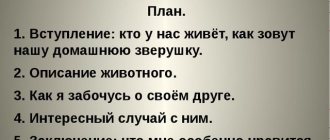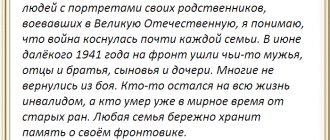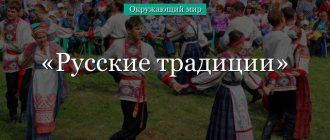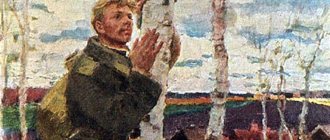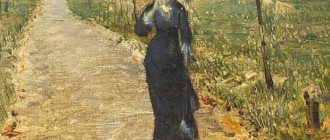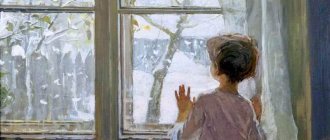- Essays
- Family
/
My family is large and friendly. Representatives of three generations have gathered under one roof - grandparents live with us.
My grandmother Sveta is seventy years old. She often talks about her mother, my great-grandmother. These stories are like little treasures in my family's memory chest. Grandma gives them to me for safekeeping. I think that if I don't keep these stories, they will disappear. Therefore, I try to write down what Sveta’s grandmother tells. This is how our genealogy is collected - the memory of distant ancestors whom we have never seen, but who are our relatives.
Great-grandmother's name was Zoya Mikhailovna Kiseleva. Her childhood was in the twenties of the last century. The great-grandmother’s family lived in the city, in a one-story house. It was a turbulent time of revolutions and changes in society. It was dangerous on the streets. There was not enough food at home, and no one ate their fill. The houses were heated by stoves; often the houses were cold due to the lack of firewood. The rules in the house were strict. The older children studied and had to learn school assignments “excellently.” Little Zoya's duty was to wipe the dishes. If the children were guilty of something, they would be punished.
Zoya Mikhailovna’s youth was filled with war, World War II. By that time she had already gotten married and lived in the city of Minsk, in Belarus. When the Nazis began occupying the city, residents went into the forests to hide from the killers. My great-grandmother was expecting a child when she had to leave home. Holding the hands of her two older children, with a heavy bag of things, the great-grandmother walked with other refugees away from Minsk. The baby was born right in the forest. It was a girl. This is how my grandmother Sveta was born.
Zoya Mikhailovna, despite the difficulties, was very optimistic and kind. She worked as a Russian language teacher. The children loved her very much, and not only her students, but also the neighboring children. My great-grandmother took care of everyone; the guys were the first to come to her with their sorrows or scratches.
Zoya Mikhailovna knew how to sew, and she also made macrame. We have some of the things she wove. We value them and store them carefully.
When I reread stories about my great-grandmother, when I pick up things she made, I feel connected to her. A connection that stretches through time. My family members are goal-oriented people who never lose their presence of mind. I think this was passed on to us from our great-grandmother, who, as they say, went through fire and water. Sometimes, when I can’t decide on something, I ask myself - what would my brave great-grandmother do in this case? And the solution comes. I hope that my grandchildren will also be interested and important in their family.
Essay 2
My family tree is quite extensive. And I would like to dwell on the story of my great-grandfather. She is difficult, but heroic.
My great-grandfather on my father's side is Ivan. He lived in a time far from us. This time was very difficult for them, now we remember them with pride, looking at the family album. My great-grandfather Ivan was a peasant. And as my grandfather told me, he was not just, but a wealthy peasant. He lived with his great-grandmother in the village and had his own mill. He worked tirelessly on it. Grinded grain, turning it into flour. All the villagers revered and respected him. And they asked for help. His work was especially desirable when the villagers were harvesting grain. In addition to the mill, they had a subsidiary farm, which was mainly managed by great-grandmother Anna. They lived well, but until a certain period in their lives. After the October Revolution, times changed, and the Soviet government equated all wealthy peasants to a certain class of people. My great-grandfather Ivan was part of this group. The Soviet government called them kulaks, and equated these people with opponents of the Soviet regime. And since 1930, such wealthy peasants began to be dispossessed. They took away their property, and some were even shot. This affected my great-grandfather greatly; the mill, which was his main job and bread, was taken away from him. They took away the cattle and left only one horse. And thus they equated him to ordinary peasants. It was a difficult time for them, so they acquired all this wealth through honest labor. And the main thing in this situation was not to break your spirit. Grandfather remembers this time and tells us with despair, resentment and grief, this affected him too, although he was a child. But my great-grandfather and great-grandmother stood and endured this time, despite the fact that it was especially difficult for them.
My grandparents on my father’s side worked all their lives at school, as a village teacher. My grandmother taught Russian language and literature, and my grandfather taught mathematics and physics.
My grandparents on my mother’s side worked on the collective farm and were front-line workers.
And my dad and mom are doctors. Mom works as a pediatrician and treats children. And dad is a surgeon, he has very complex operations.
I'm studying at school. I also have a younger brother who goes to kindergarten.
I believe that I have a wonderful pedigree. Everyone in my family has gone through a difficult journey, especially my great-grandparents. But despite this, they set a heroic example for our family. By their actions they prove to us that, no matter what happens in life, we need to go ahead and not let go, but act and achieve our goal.
Other topics: ← Adoptive family↑ FamilyMom’s childhood →
`
Essay on the history of my family
I was born in a beautiful land, at the foot of the Barkhan Mountains, on the banks of the wide Barguzin River. Our nature is amazing with its high mountains, taiga forests, wide steppes. My village is my homeland, which I love and praise. Family plays an important role for everyone. Nature itself inherent in a person is dependence, necessity, reverent attitude and devotion to the circle of people in which he grew up and comprehended the essence of his existence. In the old days, a person was inseparable from his family, and knowledge of his genealogy went back to antiquity. Every piece of this knowledge was carefully passed on from generation to generation. But now few people can tell for certain where their family originates and list the names of their ancestors more than up to the third generation. Why? Have values really changed? Fortunately, my family has carefully preserved, if not the entire, but extensive history of their family. And, as in previous times, this heritage was passed on with the stories of my parents, grandparents. And even if not everyone is with us today, history and the race itself continue to move in the life cycle. Many peoples consider it a sacred duty to know their ancestry, at least up to the fifth generation. So in China, before the Eastern New Year, the family gathers at the festive table and remembers their ancestors up to the fifth generation. The peoples of the Altai Mountains know their genealogy down to the seventh generation. The Buryat people have always treated their ancestors with special respect. According to the tradition of the Buryat people, everyone should know their ancestors up to the seventh generation, but some know their ancestry up to the twentieth. I spent a long time studying the history of my family, and, believe me, I am very jealous of those people who can trace the origin of their family back to ancient times. I belong to the great Bulagad family on my father's side. The history of the Bulagad family, which dates back several centuries, is rich. And my grandmother belongs to the Hengelder clan of the Romol subgenus on my mother’s side. According to my grandmother’s pedigree, I, together with my brother, belong to the seventeenth generation of the Hengelder clan. More details about the family tree of the Hengelder family were written in 2006 by Bair Nomoevich Tsybikov, candidate of physical and mathematical sciences, associate professor of the Ugra State University of Khanty-Mansiysk, “On famous people of the Hengelder family, subgenus Nomol.” I give only an excerpt from this work: “For the first time, six families from the Abazaev family came from the Lena River valley to Barguzin. They settled in the area of Yaarigtyn doloon narpan - “Seven Pines of Yarikta”. it is southwest of the present Yarigta ulus. This was around 1620. After 100 years, people of different clans and generations arrived here from the Lena River. A certain guy came with them in armor and a helmet. They settled in the area of Ulaan Erge, on the northern side of Baruun Khuntei, not far from the present Yarikta ulus. Pabai's armor was kept by his descendants, then taken to Mount Barkhan Under and left there as relics. The armor and helmet are still there to this day. People who climbed Barkhan to donate saw them. (Recorded from the words of Bukh Buyantuev and Sanzhi Kharamov from the Elpensky ulus of the Baraghkhan somon of the BMASSR, July 19, 1955/1, p. 257)” Having become familiar with the work of B.N. Tsybikova “On famous people of the Hengelder clan, Nomol subgenus.”, I set myself a goal: to study and reveal in detail the pedigree of my grandmother. But now, in my research work, I would like to tell the story of the family of a representative of the Hengelder clan, my grandmother Erkhitueva Erenzhid Tsydypovna. My great-grandfather Tserenei Tsedep. My grandmother’s father, my great-grandfather, Tserenei Tsedep was born in 1890 into the family of a poor steppe dweller, Garmain Tseren. They lived in the Aral area together with the families of Bardaa Shagdartan, Moorkhoobton, Muskhaatan, Malaakhaitan, Akhankhaitan. According to the stories of my grandmother, his parents kept 1-2 cows, several sheep, and were mainly engaged in hunting and fishing. In the family, Tsedep was the eldest of seven children. They were left without parents early on and my grandmother’s father remained in place of my father; all responsibility for the large family fell on his still fragile shoulders. My grandmother's father was considered the best hunter in his youth and ran a strong farm. Despite the difficult, troubled times, he raises his brothers and sisters to their feet. The younger brothers Olmo and Buda started families and live separately, and their younger sisters are growing up. At that time, the Zoltoton family lived in the Khumoo area and the young Tserenei Tsedep met the daughter of Zolto Duudheen and they were supposed to have a child. But they were not destined to share their fate. She dies during childbirth, but her daughter remains alive. And my great-grandfather takes his daughter from her parents, saying that he himself can grow up and raise her. And this happened back in 1920. After studying my grandmother's family tree, I realized how rich our ancestry is and how deeply rooted it is in the past. And I want to introduce you to the family tree of my maternal grandmother. (Appendix No. 1) Later, my great-grandfather marries a girl from Yaarigta, Gatabai Chimit. The family of cattle breeder Tsyrenov Tsydyp Garmaevich and Tsyrenova Chimit Gatapovna are raising a daughter, Erenzhid. My grandmother Erenzhid Tsydypovna. Since childhood, my grandmother was an inquisitive, capable girl and, noticing her daughter’s abilities, her parents decided to send her to school. In 1928, she was enrolled in the 1st grade of the Elysun Unified Labor School for Working Youth in the Elysun ulus, where Bardaev Shagdar Bardaevich was a teacher. Despite the difficult time, the parents gave their daughter a primary education. The desire and desire to study further after successfully completing primary school gave Erenzhid Tsydypovna the opportunity to continue her studies at the Kurumkan seven-year school. At that time, transportation of children to school was not organized due to the lack of transport; Erenzhid and classmates Tsyrenzhid Andreevna Ayusheeva, Tykheeva Sanzhi Elbenovna, Bukhaev Ochir Mukhtarovich were forced to walk to school to Kurumkan. But a serious illness interrupted Erenjid’s studies in the sixth grade. The dashing thirties... The years of collectivization, the years of the creation of collective farms and artels. And in our village, artels “Bata Baidal” and “Odon” began to be created. There were not enough people capable of working in the artels; the working population did not want to go to work in the artels. And during this difficult time, children who had not yet reached adulthood went to work in the artel. They were only 13-14 years old. My grandmother began working at the age of 14 as a cook in the Kaganovich artel. While working here, she experienced all the hardships of the pre-war period. During the harvest season, she worked from dawn to dusk, and in the winter, together with other women, they prepared firewood from matchboxes for tractors. My grandmother had a dream of becoming educated. In her free time from work, she read a lot, told her loved ones the news that was happening in the village, region, and republic from newspapers. According to the stories of my aunt, Irina Ochirovna, who devoted her entire creative life to serving children and school, my grandmother was an active participant in all cultural events, the most prominent girl in the village. At the age of seventeen she marries a career officer Ochir Gysethenovich Erkhituyev, a graduate of the Leningrad Higher Military-Political Combined Arms School. In 1939, Ochir Gysethenovich was sent as a political instructor to the Turkestan Military District and the young family left for the city of Mary, Turkmen Autonomous Soviet Socialist Republic. But further service was prevented by the war. In 1941, Red Army officer Ochir Gysethenovich was transferred to the Leningrad Military District, and my grandmother was forced to return home. In the same year, the eldest daughter Lisa was born. During the harsh war years, it was necessary to preserve collective farms and artels, but only women, old people, and children remained in the village. But the years of military devastation and hunger did not break them. “...Those were difficult years. We had to prepare firewood ourselves, sow and harvest grain, and dig potatoes. In a word, all men's work fell on the fragile shoulders of women, children, and the elderly. But we persevered,” recalls the grandmother. 1944 It seems that the war will end soon, husbands and fathers, sons and brothers will return from the war. Not everyone returned from that terrible war. My grandmother again takes the blow of fate. In 1944, her husband Ochir Gysethenovich died heroically near Leningrad, defending his homeland. He was buried at the Piskarevskoye Memorial Cemetery in Leningrad. Post-war time... Destroyed cities, villages. Widowed mothers, orphaned children. But life goes on... We need to raise everything destroyed by the war. And my grandmother, the mother of four children, works on a collective farm as a shepherd, and later as a cook at a field camp. Here she was always in good standing; she was respected for her kindness and hard work. In 1949, my grandmother linked her fate with war veteran Tsydenov Tsydyp Tsyrempilovich. And my grandmother is in the most difficult area; she and her husband work as a shepherd on the Kaganovich collective farm. In the difficult post-war times, collective farms had difficulty getting back on their feet: there were not enough workers, not enough equipment, hard work all year round, and a constant lack of feed. But despite this, people worked selflessly. And my grandmother was always among the first. In the 50s, the Tsydenov family exceeded the five-year plan, for which they were awarded a Certificate from the Regional Committee of the CPSU and the Council of Ministers of the BMASSR for achieving high indicators in the development of sheep breeding. Also in the Tsydenov family archive are certificates from the District Committee of the CPSU, the District Executive Committee, and the Collective Farm Board for achievements in work. And in this difficult, responsible time, you need to raise your children, and there were ten of them in the Tsydenov family at that time, but my grandmother never lost heart, and taught the children not to be afraid of difficulties. My grandmother worked on the collective farm until 1965. In 1965, due to health reasons, my grandmother was transferred to an easier job as a postman, where she worked until her retirement. During her long working life, she did the hardest work, but she never complained about her fate. For conscientious work and enormous contribution to the development of the village, she was awarded diplomas from the region and the republic, letters of gratitude, as well as the title “Veteran of Labor”. For her fruitful work in the postal industry, she was included in the “Book of Honor” of the regional communications center. Large Tsydenov family. The Buryat proverb says: “Gansahaa gazar duurekhe.” And it is true. Together with my grandfather, a veteran of the Great Patriotic War, Tsydyp Tsyrempilovich, they raised ten children. She raised her children to be hardworking, honest, worthy people, for which my grandmother was awarded the Order of “Maternal Glory” I, II, III degrees and was given the honorary title “Mother Heroine”. All children received an education and work in all corners of our republic, in the Chita region. The eldest daughter Lisa, having graduated from the Kurumkan secondary school, entered the Ulan-Uden school No. 1, after which she worked at the Bayangol secondary school. Son Vitaly is a candidate of agricultural sciences, works in the Tunkinsky district. Daughter Irina - born in 1945, after graduating from the Ulan-Ude Pedagogical School, she worked at the Elysun Secondary School, now on a well-deserved rest. The eldest son of the Erkhituevs, Nagan-Zana Ochirovich, born in 1948, after graduating from the Baraghan secondary school, served in the ranks of the Soviet Army. After the Army he worked on the collective farm named after. Lenin. Since 1980 – driver of the Mogoitinsky TP. Currently he is on a well-deserved rest. The son of Batozhab, born in 1956, after graduating from the Baraghan secondary school, entered the Ulan-Ude Forestry Technical School; the family of Batozhab Tsydenovich lives in the Chita region. Sons Galsan and Tumen are currently in the village of Ivolginsk, Ivolginsky district. Galsan Ochirovich graduated from the Belarusian State Pedagogical Institute named after D. Banzarov, is a master of sports of the USSR in archery, and worked as a coach for a youth sports school for a long time. Daughter Rosa, born in 1954, after graduating from the Baragkhan secondary school, entered the Ulan-Ude College of Communications; after graduating, she returned to her native village and worked as the head of the post office of the village of Baragkhan until her retirement. Daughter Rita, born in 1961, after graduating from the Chita Medical School, worked in the Mogoituysky district of the Chita region, since 1988 she worked as a sanitary paramedic at the Barguzin Sanitary and Epidemiological Station, and is currently working as an assistant to the chief physician of the Sanitary and Epidemiological Station. The youngest son Solbon, born in 1962, after serving in the Soviet Army, entered State Technical University No. 7 in Ulan-Ude. Then he returned to his native village and worked as a builder on the collective farm named after. Lenin since 1983, since 1999 he worked at Elesun Secondary School. The grandmother is proud that among her children there are veterans of teaching, a veteran of the postal service, and a master of sports. I am my grandmother’s 24th grandchild and my grandmother also has 32 great-grandchildren. Now our grandmother is still cheerful and cheerful. Despite her advanced age, she helps us with housework. Every summer, children and grandchildren come to visit their grandmother. This is such a difficult and worthy, but happy life for my grandmother. And I wish for my grandmother that she never gets sick, is always joyful and lives a long, happy life. Conclusion Using the example of my family, I realized that any trials and tribulations can be overcome if you have close, reliable people next to you who will come to your aid in difficult times. Knowing who our ancestors were, we understand our position in the present differently! The family ensures the continuation of the human race and takes upon itself the upbringing of children. Parents pass on life experience, rules and traditions to their children, and instill behavior patterns that are established in society. The family has a decisive influence on the personality of the child, as well as on the age members of the family. It satisfies human needs for love, spiritual communication, moral and material support, and organization of leisure and recreation. She takes care of young and elderly family members, gives stability and stability to society.
Popular writings
- An essay on the topic Victims of the Dark Kingdom based on the play by Ostrovsky Groz
Have you ever been in a basement? Darkness, closed space, stale air frighten a person and do not allow him to breathe easily... Have you read N. Ostrovsky’s play “The Thunderstorm”? - Essay Onegin and Pechorin (9th grade)
The heroes of Onegin and Pechorin lived in different periods of time. For Onegin, there were years of rebellion and freedom; the era of Decembrism reigned in Russia, and Pechorin was a child of timelessness. Works of Pushkin and Lermontov - Essay on the topic My native language (Russian)
Every person, every nation has its own native language. The language he must know, the language his ancestors speak, the language his descendants will speak. Every person should keep



